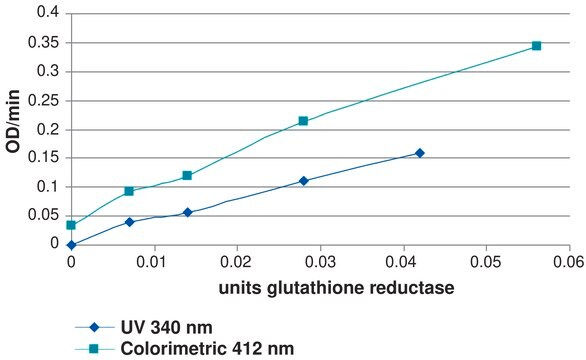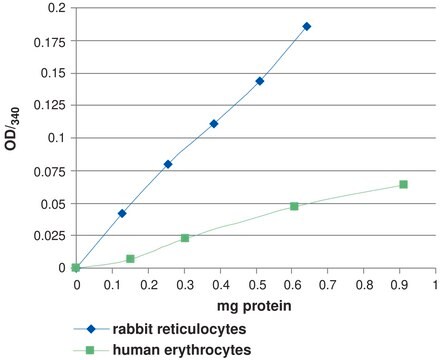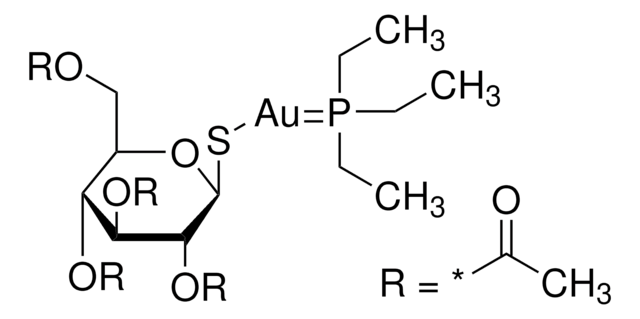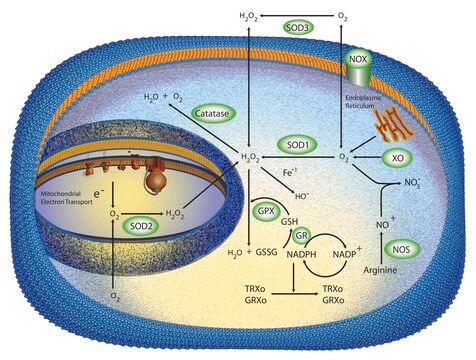38185
Quantification kit for oxidized and reduced glutathione
200 tests
Synonyme(s) :
γ-L-glutamyl-L-cysteinylglycine kit, Quantification kit
Se connecterpour consulter vos tarifs contractuels et ceux de votre entreprise/organisme
About This Item
Code UNSPSC :
12352108
Nomenclature NACRES :
NA.32
Produits recommandés
Catégories apparentées
Description générale
Glutathione Quantification Kit is designed to detect oxidized and reduced Glutathione. Glutathione is usually represented in a reduced form called GSH; however, GSH is converted into its oxidized state (GSSG) upon oxidative stress. The ratio between GSH and GSSG is considered an index for oxidative stress. Glutathione, also known as γ-L-glutamyl-L-cysteinylglycine, is a tripeptide compound that is involved in anti-oxidation and drug metabolism. It acts as a substrate for enzymes like glutathione peroxidase, glutathione S-transferase, and thiol transferase.
Application
Glutathione Quantification Kit is used to detect the total amount of glutathione as an index for oxidative stress or disease risk.
Caractéristiques et avantages
The detection ranges of total glutathione and GSSG using in this kit are from 0.5 μmol/l to 50 μmol/l and from 0.5 μmol/l to 25 μmol/l, respectively.
Composants
Glutathione Quantification Kit contains:
- Enzyme Solution (50µl X 1)
- Buffer Solution (60ml X 1)
- Standard GSH (X 1)
- Masking Reagent (20µl X 1)
- Co-enzyme (X 2)
- Substrate (DTNB) (X4)
- Standard GSSG (X 1)
Remarque sur l'analyse
Glutathione Quantification Kit contains a GSH masking reagent. This enables GSSG detection in the sample by measuring the absorption (λmax = 412 nm) obtained from a colorimetric reaction of DTNB (5,5’-dithiobis (2-nitrobenzoic acid)) coupled with the enzymatic recycling system. The total quantity of GSH can be measured by subtracting the amount of GSSG from the total amount of glutathione.
Autres remarques
not available in Korea, Singapore, Taiwan and Japan
Mention d'avertissement
Danger
Mentions de danger
Conseils de prudence
Classification des risques
Eye Irrit. 2 - Flam. Liq. 2 - Skin Irrit. 2 - Skin Sens. 1
Code de la classe de stockage
3 - Flammable liquids
Faites votre choix parmi les versions les plus récentes :
Déjà en possession de ce produit ?
Retrouvez la documentation relative aux produits que vous avez récemment achetés dans la Bibliothèque de documents.
Les clients ont également consulté
Geng Tian et al.
Antioxidants & redox signaling, 20(16), 2606-2620 (2013-10-16)
The present study was conducted to define the relationship between the anti-aging effect of ubiquinol-10 supplementation and mitochondrial activation in senescence-accelerated mouse prone 1 (SAMP1) mice. Here, we report that dietary supplementation with ubiquinol-10 prevents age-related decreases in the expression
Protective Effect of Lycii Radicis Cortex against 6-Hydroxydopamine-Induced Dopaminergic Neuronal Cell Death.
Hyo Geun Kim
Journal of Food Biochemistry, 39, 281-288 (2015)
Anna Maria Czarnecka et al.
Nutrients, 12(7) (2020-07-28)
Acute liver failure (ALF) impairs cerebral function and induces hepatic encephalopathy (HE) due to the accumulation of neurotoxic and neuroactive substances in the brain. Cerebral oxidative stress (OS), under control of the glutathione-based defense system, contributes to the HE pathogenesis.
Zheng-Guo Cui et al.
European journal of pharmacology, 723, 99-107 (2013-12-11)
Hyperthermia is a good therapeutic tool for non-invasive cancer therapy; however, its cytotoxic effects are not sufficient. In the present study, withaferin A (WA), a steroidal lactone derived from the plant Withania somnifera Dunal, has been investigated for its possible
Katsuya Unno et al.
Journal of applied toxicology : JAT, 34(2), 205-213 (2013-01-26)
Cadmium (Cd) is a heavy metal widely used or effused by industries. Serious environmental Cd pollution has been reported over the past two centuries, whereas the mechanisms underlying Cd-mediated diseases are not fully understood. Interestingly, an increase in reactive oxygen
Notre équipe de scientifiques dispose d'une expérience dans tous les secteurs de la recherche, notamment en sciences de la vie, science des matériaux, synthèse chimique, chromatographie, analyse et dans de nombreux autres domaines..
Contacter notre Service technique











